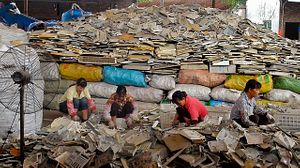On July 18, China notified the World Trade Organization (WTO) that it would stop accepting shipments of rubbish such as waste plastic, paper, slag from steelmaking, waste wool, ash, cotton, and yarn; the import ban would become effective by the end of this year. Chinese netizens expressed their mixed feelings toward their government’s new decision.
According to a Reuters report, China’s WTO filing said:
We found that large amounts of dirty waste or even hazardous waste is mixed in the solid waste that can be used as raw materials. This seriously polluted China’s environment… To protect China’s environmental interests and people’s health, we urgently adjust the imported solid wastes list, and forbid the import of solid wastes that are highly polluted.
Based on the data provided by Reuters, China, as a major importer of waste, imported 7.3 million tons of waste plastics in 2016, valued at $3.7 billion, accounting for 56 percent of world imports. And the United States and Japan are the two biggest exports of plastic waste to China.
Actually, the United States exports more kinds of trash to China than plastic waste. As QUARTZ shows, “Americans generally don’t recycle their plastic; they export it. And more than half of the $1 billion a year business goes to China.”
According to the Wall Street Journal’s data, by 2012, trash — including waste paper, soiled cardboard, crushed beer cans and junked electronics — was the United States’ leading export. And China was America’s No. 1 trash importer, by number of cargo containers.
Faced with the Chinese government’s new announcement, Chinese netizens expressed their mixed feelings. On the one hand, people almost overwhelmingly welcomed the decision; on the other hand, the majority were shocked by the fact that China has been legally importing the waste for so many years. Some netizens commented sharply: “Who allowed you to import this trash in the first place?”
In recent years, as China’s environment — water, air, and soil — increasingly deteriorates, more and more Chinese people are demanding their government curb the environmental pollution more seriously.
In fact, the Chinese government did issue specific regulations on importing solid waste years ago. As early as 2011, China’s Ministry of Environmental Protection, together with other four ministries, issued detailed measures on solid waste imports and required local regulators to strengthen enforcement. Yet it is obvious that the regulations weren’t followed well in reality. In 2014, the Ministry of Environmental Protection again issued an announcement on managing solid waste, criticizing local officials’ negligence and corruption in environmental protection.
In April 2017, China’s central government issued a new regulation on foreign trash imports again, emphasizing its resolution on environmental protection. What is different this time is that the new regulation was put forward by the Chinese president himself. As the new WTO filing is a part of this anti-foreign garbage campaign, it seems that China is really getting serious now.
Charlotte Gao holds a MA degree in Asian Studies. Her research interests center around East Asian topics. She has worked in the past as a news editor, reporter, and writer for multiple traditional, online, and new media outlets.

































